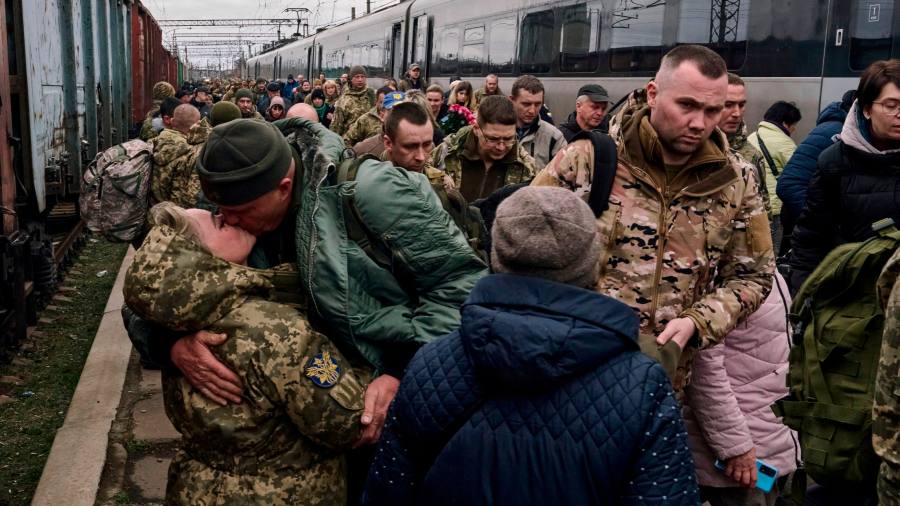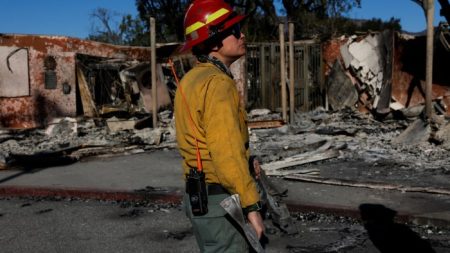Russia and Ukraine have tightened their conscription rules ahead of a widely expected Ukrainian counter-offensive in the coming weeks.
In Moscow, the parliament rushed through legislation on Tuesday, making it significantly more difficult for Russians to dodge the draft and automatically banning registered conscripts from leaving the country.
In Ukraine, where men aged 18 to 60 have been banned from leaving the country since Russia launched its full-scale invasion last year, the government on Tuesday approved new rules allowing recruitment centres to send summonses anywhere in the country. Previously, summonses could only be handed to men at their registered addresses, but tracking them down proved difficult due to large-scale internal migration as a result of the war.
Both countries’ conscription changes come amid continuing Russian attacks and as Ukraine calls up and trains thousands of new soldiers for its own counteroffensive after both sides suffered huge losses on the eastern front.
Kremlin spokesperson Dmitry Peskov said the changes aimed to improve the military registration system and “have nothing to do with mobilisation”. In September last year when Russia first started mobilising recruits to the Ukrainian frontline, hundreds of thousands of people fled.
“The Kremlin does not think that the changes will cause panic and a new wave of emigration,” he added.
The Russian parliament adopted the legislative changes in emergency proceedings on Tuesday, with several MPs complaining they had not had time to read the text properly. However, no lawmakers voted against the changes, and only one abstained.
In Russia, conscription notices had to be previously handed in person at the draftee’s registered address. The latest legislative changes enable summonses to be mailed by post or digitally, and now a notice will be considered officially received by a prospective draftee one week after it is issued, whether or not it has actually been received.
Once a Russian notice is delivered, the conscript is prohibited from leaving the country until they visit the recruitment office. Those who fail to show up within 20 days are prohibited from driving cars, taking out loans and from buying, selling or renting out any property under long-term contracts.
The Russian changes apply to both mobilisation for the Ukrainian front and regular conscription of men aged 18 to 27, which occurs every six months. An electronic register of people required to complete military service will be set up to replace folders in conscription offices scattered all over the country and lacking communication.
Russians may now be added to the army reserve without even having visited a conscription office in person — they will simply be informed of their change of status on their account page on a government portal. Police will have the right to pursue draft dodgers, and government authorities, as well as employers, will be required to hand over people’s personal information to recruitment offices.
Ukrainian lawmakers have floated ideas and introduced bills on sending summonses by a mobile app used for government services and on setting up a public registry of people dodging the draft. Those ideas have yet to be approved.
Western officials estimate that as many as 220,000 Russian soldiers have been killed or wounded in the fighting, and there have been more than 100,000 Ukrainian casualties.
Leaked US intelligence documents offer a further breakdown, suggesting that 43,000 Russian soldiers have been killed and as many as 180,000 wounded, while as many as 17,500 Ukrainian soldiers have been killed in action with 113,500 wounded.
Russian emigration poses a problem not only to its military but also to its labour force. About 500,000 Russians have fled the country on an at least somewhat permanent basis since the start of the invasion, a majority of them men of fighting age.
“We are deeply concerned about the labour force deficit,” Russian economy minister Maxim Reshetnikov said in December. Four months later, he suggested that businesses plug the gaps by hiring “moms, people with disabilities and youth”.
Additional reporting by John Paul Rathbone in London
Read the full article here
















